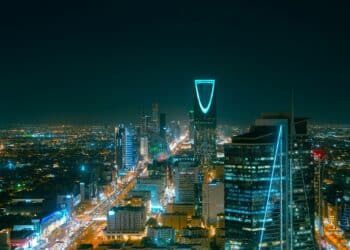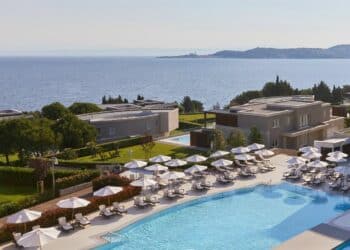With building selective partnerships at the forefront of why Dur Hospitality’s business model is so successful, Dr. Badr al Badr, CEO, Dur Hospitality tells Sophia Soltani why spiritual hospitality is at the core of his ethics and how he plans on driving forward $400m worth of new hotel projects in Saudi Arabia.
Leading Saudi hospitality company, Dur Hospitality was first established in 1976 and is internationally recognised for its extensive track-record in managing, developing and operating a wide portfolio of hotels across Saudi Arabia. Formerly known as Saudi Hotels and Resorts Co (SHARACO), the company rebranded in 2014 with a renewed focus on representing the true meaning of Saudi hospitality. True to its nature, the group’s chain of spiritually focused hotels, Makarem has been specifically designed to aid Hajj and Umrah pilgrims maximise their experience in the holy cities of Madinah and Makkah. With the company ahead of its schedule to invest $400 million into 20 new hotel properties, who better to spearhead these dreams into a reality than the company’s CEO, Dr. Badr al Badr who holds Saudi Arabia, its heritage and hospitality clo se to his heart.
se to his heart.
Growing Economy
Saudi Arabia is currently leading the way with hotel construction across the Middle East, according to the June 2016 pipeline report from STR, the Kingdom is racing ahead with 35,770 rooms under construction in 81 hotels, overtaking the UAE by 8,781 hotels, but according to Badr, this growth comes as no surprise as he explains: “On account of the current economic stability and growth in the Kingdom, the potential of the business travel segment continues to offer an incredibly promising opportunity in the region.
“Saudi Arabia has been making bold movements in terms of development, which has led to a boost in economic activity, attracting investors and professionals in large numbers.”
With such large numbers of hotels under construction, it could be argued that room rates have the potential to suffer a decline, but according to Badr, he says an increase in interest from investors and supply has only benefited Saudi’s hospitality industry further. “This has naturally increased the demand for quality hotels and room rates have also achieved an increase of 8.9% to SAR 968.73 for year-end, which resulted in a RevPAR increase of 9.9%. Jeddah has been able to achieve rate increases consecutively over the past 32 months, with the highest ADR achieved for the city since 2000.”
Domestic Tourism
With Saudi Arabia busy making plans to relinquish its reliance on oil for economic support, the tourism and hospitality sector is set to play a big part in the Kingdom’s 2030 Vision, with domestic tourism a focal area for the tourism authorities, Badr explains: “Lately we have noticed a strong trend in Saudi Arabia in terms of a growing domestic tourism. The Saudi Government has been taking every possible step to nurture this new target market. The intention behind Saudi Arabia’s recent growth in domestic tourism is attributed to the government’s efforts to encourage local citizens to discover their own country which helps grow the domestic tourism economy as opposed to what used to be a steady outflow of tourist Riyals as Saudis mainly travelled abroad for their vacations. We are now seeing more locals from different regions of Saudi Arabia travel to Riyadh for long weekends or holidays.”
Investors prerogative
As luxury travel makes a major comeback in the Kingdom as consumers continue to put a greater emphasis on experiences over tangible goods Badr highlights the importance of building relationships with a diverse variety of investors without diluting one’s brand, explaining: “We believe in strategic relationships, that’s why we have decided to work within the bounds with a few strategic partners rather than to open up to others that perhaps don’t understand our ethics. We then run the risk of diluting our brands and be seen as opportunistic. Each method has its own advantage, but by being opportunistic, you could end up going for a particular hotel or property and find that it is best operator but they don’t reflect our terms or morals. One of our main brand values is trust and long-term relationships between our clients and our partners.”
With Marriott International one of Dur Hospitality’s preferred partners, he says: “We are a firm believer in the value of relationships; we have a 40-year-long relationship with Marriott that has been through plenty of ups and downs and even withstood different management in both companies. We are very proud of such a relationship and we’d like to continue to have these kinds of relationships, and that can only happen when you have a handful of trusted partners and not many.”
Stressing the importance of founding principles that Dur prides itself on for a good working relationship Badr adds: “For that reason, we are focusing on these two relationships. We might start maybe one more, but we are not looking heavily into that, and if it happens it will be because we find a quality operator with the prospect of a long-term partnership.”
With one such partnership with Marriott being the expansion of the Marriott Hotel at Riyadh Airport, touching upon the new opportunities this will bring Badr says: “Increased traveller traffic at the airport definitely opens up opportunities for support services. One definitely being hospitality and new hotels. Right now we’re the only hotel in the airport area. We’ve been enjoying very high occupancy rates, which led us and the authority to look at expanding it. And that’s where the expansion idea was born. It’s a fast-track project and we really hope to be able to open the doors of the expansion in approximately two years.”
Tradition
Saudi Arabia is a unique market where businesses have to be sensitive to customs and traditions and discussing how Dur Hospitality and Makarem cater to traditional Saudi values, Badr explains: “I would say that with a great understanding of such traditions, hotels can create better marketing opportunities in this sector just like we did with our Makarem hotels.”
Moving on with how the rebrand unified the brands under the Dur umbrella, Badr continues: “Makarem has been around for the last 20 years under different names, but in 2013 we reviewed our strategy and decided to unify the brand, focusing on the holy cities of Makkah and Madinah. We differentiate ourselves against other operators by supporting the whole journey and the total spiritual experience. A visitor who is coming to the Kingdom to perform Hajj and Umrah is not your regular business traveller.”
Explaining how Makarem caters to the spiritual element of a religious traveller’s journey, he says: “The whole trip is a spiritual experience and international brands have a hard time understanding it, therefore are unable to cater the same way we do. We understand the basic needs and we then add in the Saudi touch of Saudi hospitality. That’s something that the international brands that we compete with are unable to do.
“International operators are very consistent in offering the same experience and quality in all other markets, but the people who come to perform Hajj and Umrah want to feel the country, they want to connect and discover the elements of Saudi hospitality and everything it stands for. So we integrate those elements, the local elements plus the spiritual elements into the mix to differentiate ourselves.”
Saudisation
True to its Saudi roots, Dur Hospitality is on a mission to increase its employee base and aims to have a 35% increase in Saudi employees, discussing the reason behind this move, Badr explains: “Tourism is one of the sectors that has a traditionally high turnover and if you look at the number of employees per dollar of capital, you’ll find that tourism is on the higher side. For example, compared to oil and gas and some of the petrochemical manufacturing companies. So this made tourism a natural area to employ Saudis.
“The government target for hospitality is 25%. We at Dur focus a lot and are a firm believer that our national workforce should be the ones, or a main component of the associates that serve our customers. Right now our Saudisation efforts sit at 33% reaching up to 35%. This makes us one of the hospitality companies with higher Saudisation ratios and we’re proud of that as we plan on continuing on this path.”
Emphasising the importance of authentic Saudi hospitality in a hotel, Badr insists that being hospitable stems from the core of Saudi culture and is imperative for the success of a hotel to carry the same ethos over to each and every property. “Modern hospitality is very recent in Saudi Arabia. Even though hospitality is part of our culture, it is not in an institutionalised form. Hospitality, meaning Bedouin hospitality, is part of our culture, being and moral fibre. When we see a visitor coming through town, we invite them to our house. We invite them in for lunch, tea, or just a chat, and we really insist to the point of irritation! But it’s part of the culture.
“Projecting that into a hotel environment and working in a hotel, now that’s a transition that we need to make. I think if you make that transition successfully, then we can capitalise on the hospitable instincts that Saudis usually have and are brought up around.”
Reflecting on how the hospitality industry can be perceived as a “less desirable” industry to enter for Saudis, Badr stresses: “Right now when you look at the majority of Saudis in employment and the distribution of the Saudi workforce, many of them go into government led jobs, the military and banking and finance roles. So hospitality has not been one of their first choices, hence why we aim to change that and make the hospitality industry much more of an attractive place to work in.”


































































